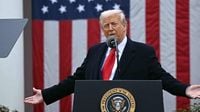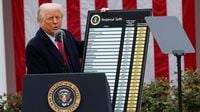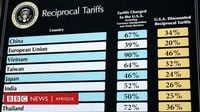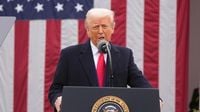On April 2, 2025, President Donald Trump announced a sweeping series of tariffs affecting 185 countries and territories, ranging from 10% to 50%. This move, which he termed a step toward "economic independence" for the United States, marks his most extensive tariff offensive since returning to the White House. In a speech delivered to members of his cabinet and various industry leaders, Trump characterized the day as a "day of liberation" for American workers, echoing his rhetoric regarding the upcoming presidential election on November 5, 2024, and his inauguration on January 20, 2025.
"April 2, 2025, will forever be remembered as the day of the rebirth of American industry," Trump proclaimed, painting a grim picture of the United States' trade relationships. He asserted that for decades, the country had been "pillaged, ravaged, and robbed" by both close and distant nations. In this new trade landscape, Canada and Mexico, America’s primary trading partners, were notably exempt from the so-called "reciprocal" tariffs, which were primarily aimed at countries like China and those in the European Union.
China faces a staggering 34% tariff on its goods, while the EU will see a 20% levy applied. This latest round of tariffs raises the cumulative tariffs on Chinese imports to 54% since they were first targeted in February. Other countries, including Japan and India, will also see significant tariffs, with Japan facing a 24% tax and India a 26%. The most severe tariffs will be imposed on Lesotho at 50%, Cambodia at 49%, and Vietnam at 46%.
The new tariffs are set to take effect in two phases: a 10% base tariff will be imposed on April 5, 2025, followed by additional surtaxes on the most penalized countries starting April 9. Moreover, a 25% tariff on automobiles manufactured outside the U.S. will be implemented immediately, affecting foreign-built vehicles and parts.
Since March 2025, most Canadian exports have already been subjected to tariffs of 10% or 25%. Following Trump’s announcement, the Senate narrowly passed a bill to eliminate tariffs on imports from Canada, although it is unlikely to progress in the Republican-controlled House of Representatives. Steel and aluminum imports have faced 25% tariffs since mid-March.
In a CNN interview, U.S. Treasury Secretary Scott Bessent urged other countries not to retaliate, suggesting that immediate responses could lead to escalation. However, many trading partners are expected to announce countermeasures, with China already promising to retaliate against the tariffs. European Commission President Ursula von der Leyen stated that the EU is preparing a response, emphasizing that the tariffs would have significant consequences for the global economy.
Trump has defended his approach, claiming it would bring manufacturing back to the U.S. and bolster government revenues. Economists, however, project that these tariffs could lead to increased prices for consumers and dampen economic growth, with some warning of a potential recession. The stock markets reacted negatively to the tariff news, with Asian markets opening lower following the announcement.
In a peculiar twist, the administration has also imposed tariffs on the uninhabited Heard and McDonald Islands, located near Antarctica, despite these territories having no significant trade relationships with the U.S. Australian Prime Minister Anthony Albanese remarked, "Nowhere on Earth is safe" from these tariffs, highlighting the absurdity of including such remote locations in the tariff list.
Amidst this tumult, Trump's spokesperson, Karoline Leavitt, insisted that the U.S. would emerge "stronger" from these measures. She dismissed concerns from Wall Street, asserting that the president’s strategy would ultimately benefit American workers. Despite this optimism, the immediate impact on U.S. stock markets was severe, with futures dropping sharply following the tariff announcement.
As the tariffs loom, the implications for global trade are profound. The U.S. recorded a trade deficit of $918 billion in 2024, up 17% from the previous year, and analysts warn that Trump's policies could exacerbate inflation and lead to a slowdown in economic activity. The potential for a global economic downturn has increased, with many experts predicting that the tariffs could trigger a recession not only in the U.S. but worldwide.
In the wake of these developments, countries around the globe are reassessing their trade strategies. Many Latin American nations will be subjected to a minimum tariff of 10%, with only Nicaragua and Venezuela facing slightly higher rates. The exclusion of Canada and Mexico from the new tariffs has been interpreted as a strategic move to maintain favorable relations with these key partners.
As the situation evolves, the balance of power in global trade is shifting. The ramifications of Trump's tariff policies are likely to be felt for years to come, as nations adapt to this new economic reality. The world watches closely as the U.S. embarks on this unprecedented path, one that threatens to reshape international commerce and relations.









